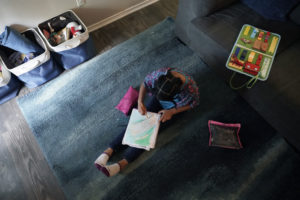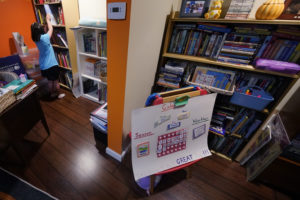
by David Crary, AP National Writer | Jul 27, 2021 | Commentary, Headline News |

Felicity Brown, 9, uses a workbook to practice math with her parents and siblings at home in Austin, Texas, on Tuesday, July 13, 2021. After homeschooling during the pandemic, the Brown family has switched to homeschooling their kids permanently using a Catholic-based curriculum and won’t be sending them back to in-person schools in the fall. (AP Photo/Eric Gay)
Although the pandemic disrupted family life across the U.S. since taking hold in spring 2020, some parents are grateful for one consequence: They’re now opting to homeschool their children, even as schools plan to resume in-person classes.
The specific reasons vary widely. Some families who spoke with The Associated Press have children with special educational needs; others seek a faith-based curriculum or say their local schools are flawed. The common denominator: They tried homeschooling on what they thought was a temporary basis and found it beneficial to their children.
“That’s one of the silver linings of the pandemic — I don’t think we would have chosen to homeschool otherwise,” said Danielle King of Randolph, Vermont, whose 7-year-old daughter Zoë thrived with the flexible, one-on-one instruction. Her curriculum has included literature, anatomy, even archaeology, enlivened by outdoor excursions to search for fossils.
The surge has been confirmed by the U.S. Census Bureau, which reported in March that the rate of households homeschooling their children rose to 11% by September 2020, more than doubling from 5.4% just six months earlier.
Black households saw the largest jump; their homeschooling rate rose from 3.3% in the spring of 2020 to 16.1% in the fall.
The parents in one of those households, Arlena and Robert Brown of Austin, Texas, had three children in elementary school when the pandemic took hold. After experimenting with virtual learning, the couple opted to try homeschooling with a Catholic-oriented curriculum provided by Seton Home Study School, which serves about 16,000 students nationwide.
The Browns plan to continue homeschooling for the coming year, grateful that they can tailor the curriculum to fit their children’s distinctive needs. Jacoby, 11, has been diagnosed with narcolepsy and sometimes needs naps during the day; Riley, 10, has tested as academically gifted; Felicity, 9, has a learning disability.
“I didn’t want my kids to become a statistic and not meet their full potential,” said Robert Brown, a former teacher who now does consulting. “And we wanted them to have very solid understanding of their faith.”
Arlena Brown, who gave birth to a fourth child 10 months ago, worked as a preschool teacher before the pandemic. Homeschooling, she says, has been a rewarding adventure.
“In the beginning, the biggest challenge was to unschool ourselves and understand that homeschooling has so much freedom,” she said. “We can go as quickly or slowly as we need to.”

Felicity Brown, 9, draws as she takes a break from math practice at her home in Austin, Texas, Tuesday, July 13, 2021. After homeschooling during the pandemic, the Brown family have switched to homeschooling their kids permanently using a Catholic-based curriculum and won’t be sending them back to in-person schools this fall. (AP Photo/Eric Gay)
Race played a key role in the decision by another African American family to homeschool their 12-year-old son, Dorian.
Angela Valentine said Dorian was often the only Black student in his classes at a suburban Chicago public school, was sometimes treated unfairly by administrators, and was dismayed as other children stopped playing with him.
As the pandemic eased, the family decided to keep Dorian at home and teach him there, using a curriculum provided by National Black Home Educators that provides content for each academic subject pertaining to African American history and culture.
“I felt the burden of making the shift, making sure we’re making the right choices,” Valentine said. “But until we’re really comfortable with his learning environment, we’ll stay on this homeschool journey.”
Charmaine Williams, who lives in the St. Louis suburb of Baldwin, also is using the National Black Home Educators curriculum as she homeschools her 10-year-old son, Justin, and 6-year-old daughter, Janel.
Williams said she and her husband tried two previous stints of homeschooling for Justin after school officials complained about his behavior. Now — with the new curriculum and an accompanying support network — they feel more confident about choosing it as a long-term option.
“At school, children have to follow a certain pattern, and there’s bullying, belittling — compared to being home where they’re free to be themselves,” Williams said.
“There’s no turning back for us now,” she added. “The pandemic has been a blessing — an opportunity to take ownership of our children’s education.”

Lily Osgood, 7, selects a book to read from the family library of nearly 2,000 books she shares with her brother, Noah, Tuesday, July 20, 2021, in Fairfax, Vt. The Osgood children will continue to be homeschool this upcoming school year. As the pandemic took hold across the United States in the spring of 2020, it brought disruption and anxiety to most families. Yet some parents are grateful for one consequence: they are now opting to homeschool their children even as schools plan to resume in-person classes. (AP Photo/Charles Krupa)
Joyce Burges, co-founder and program director of National Black Home Educators, said the 21-year-old organization had about 5,000 members before the pandemic and now has more than 35,000.
Many of the new families experienced difficulties, including lack of internet access, that limited their children’s ability to benefit from virtual learning during the pandemic, Burges said.
“It got so they didn’t trust anything but their own homes, and their children being with them,” she said. “Now they’re seeing the future — seeing what their children can do.”
For some families, the switch to homeschooling was influenced by their children’s special needs. That’s the case for Jennifer Osgood of Fairfax, Vermont, whose 7-year-old daughter Lily has Down syndrome.
Having observed Lily’s progress with reading and arithmetic while at home during the pandemic, Osgood is convinced homeschooling is the best option for her going forward.
She has made the same decision for her 12-year-old son Noah, who didn’t like the remote classes offered by his public school in the spring of 2020, and did homeschooling throughout the 2020-21 school year. It went so well that they want to continue for at least a few more years.
“He told me he was learning so much more at home than he ever did in school,” Osgood recalled. “He said, ‘School is just so chaotic — we don’t get very much done in any particular class. Here, I sit down, you tell me what to do, and minutes later I’m done.'”
Heather Pray of Phoenix, Maryland, says homeschooling has been a major success for her 7-year-old son, Jackson, who has autism. The family made the switch because Jackson was struggling with the virtual learning that his school provided during the pandemic.
“My son did great (with homeschooling), even with just two hours of schoolwork a day,” Pray said. “I got him into piano lessons, taught him to read.”
Pray is also homeschooling her daughter, Hayley, who’s going into 7th grade and had been attending a Christian school.
“I had no idea how this was going to go — I just dove in headfirst,” said Pray. “I felt God was holding my hand.”
The Gonzalez family from Appomattox, Virginia — who are devout Catholics — opted to homeschool their three sons, ages 9, 13 and 15, after their Catholic school in Lynchburg closed in 2020 due to falling enrollment.
They’re using the Catholic-focused curriculum from Seton Home Study School, which Jennifer Gonzalez, the boys’ mom, described as rigorous but well-organized.
“My kids have just excelled,” she said. “We’re able to be home and be together.”
by Constance Troutman, Urban Faith Contributing Writer | Dec 27, 2019 | Headline News |

A desire for self-improvement and positive change is the very reason why New Year’s has long been my favorite holiday. It’s been the time of year when I’ve been most willing and ready to embrace change. It’s a time when I pause to reflect on my growth and accomplishments to date—whether personal or professional—and then readily consider any areas that might require some adjustments. It’s during this time when I make those required adjustments plain by translating them into a list of resolutions so that, come January 1st, I can become the “new me.”
But, I’ve never gotten around to achieving all of my resolutions—most people don’t. In fact, studies show that only 8% of those who make New Year’s resolutions go on to achieve them.
That’s pretty disappointing.
But the good news is there is the Good News.
I finally began to study God’s Word and found that, as a Christian, I don’t have to wait until a new year to become the “new me” or even an “improved me,” and I certainly don’t have to tackle these changes on my own. The Word has matured me so much spiritually, and that has translated to my personal and professional growth this past year.
Here are three biblical resolutions that will help you, too, become the “new you” in the New Year:
In all your getting, get understanding.
I used to resolve to read more books or master a new language to become more cultured and learned, which isn’t a terrible goal. But meanwhile, I didn’t know much about the God to whom I claimed to devote my entire life.
There is no knowledge any of us can obtain that is more valuable than the knowledge of God. Knowing His will, voice, character, purposes, and promises give us the wisdom we need to navigate this life, and it girds our spirit to commune with Him in Spirit and in truth (John 4:24).
This wisdom also spills into our familial and romantic relationships and leads us toward wiser financial, career and business decisions. The beginning of wisdom is to fear the Lord, and knowledge of Him is understanding (Proverbs 9:10). So, in all our getting, we should certainly resolve to get that!
Seek first the kingdom of God and His righteousness.
We might set out in search of a new career or even our life’s purpose in the new year. However, the benefit of first seeking the kingdom of God and His righteousness is that you begin to learn that you already have purpose (to glorify God), a destiny (to abide with God in eternity as an heir with Christ), and a job (to make disciples).
Our inherent gifts and talents then indicate how we might best carry out this purpose. From there, we begin to operate in God’s perfect will for our lives. And by being in God’s will, any material resources or people we might need to help us fulfill that purpose will come—and we are guaranteed access to them through prayer (1 John 5:14–15).
Be transformed by the renewing of your mind.
One year I resolved to smile more, but I still lacked genuine joy and I continued to battle attitude problems, depression, and other sins of the flesh. But the Word of God gives us a renewed mind, which is the mind of Christ.
Through Him we have a new perspective on this life because in Him we find light, love, and truth. And knowing the truth sets us free (John 8:31). It is not enough to read self-help or leadership books for tips and tricks to tackle certain aspects of life. Some might offer helpful treatment. But healing is found in Jesus Christ.
There is so much transformative power in the pages of God’s Word. As you prayerfully study it, the Holy Spirit will do a work in you that puts your New Year’s list of “to- dos” to shame. Making resolutions is great! But filtering those resolutions through the Lord is profitable. This is the only way we will enjoy change that is lasting and accomplish goals that will matter this year and for years to come.






